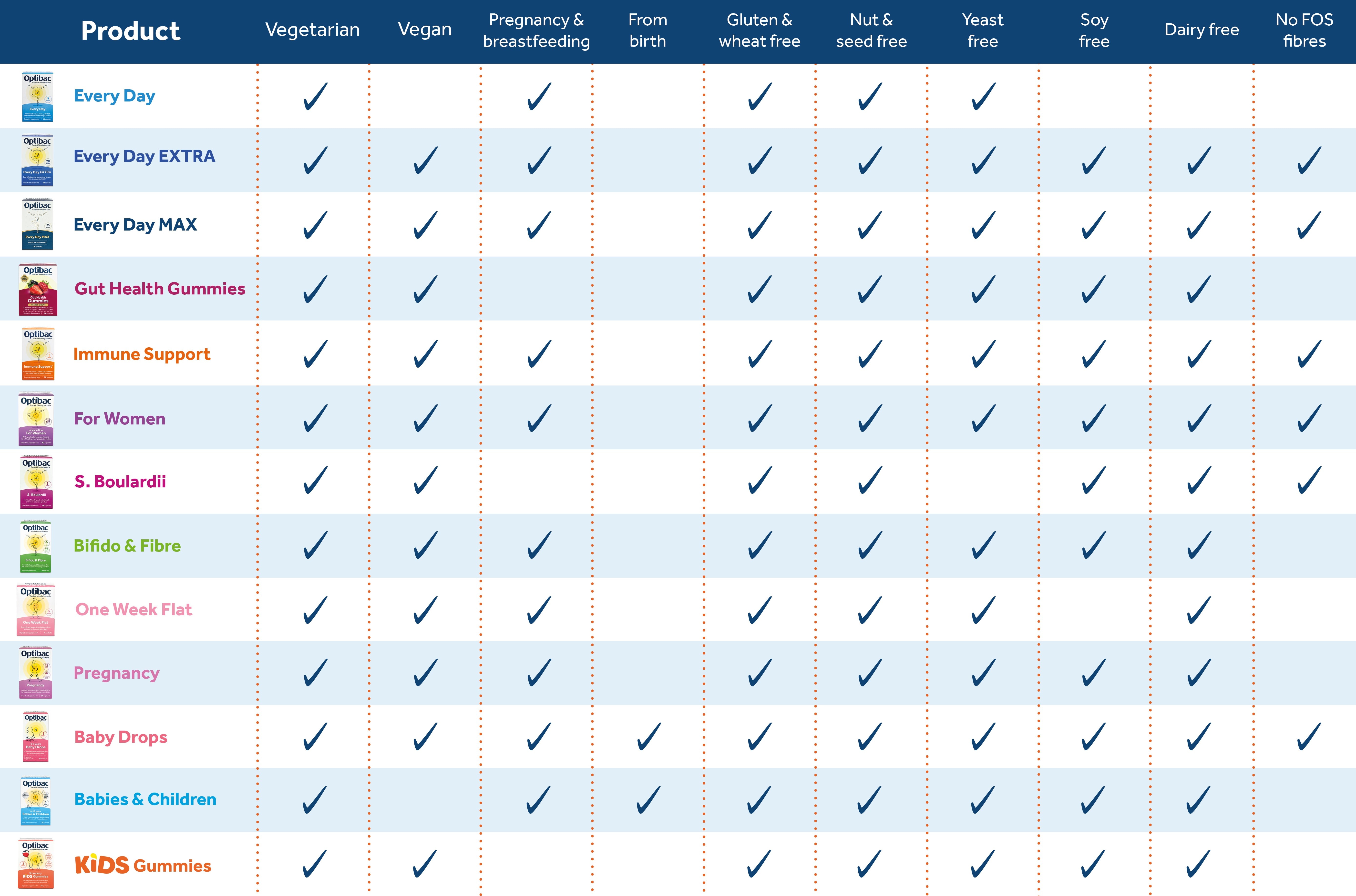You're away from FREE US delivery Free US delivery (applied at checkout) on orders over $60.00
You have qualified for Free US delivery
Suitability
Do Probiotics Contain Casein Protein?
While most probiotics are completely safe to take if you have an allergy to casein protein, some probiotic bacteria may have been cultured in a way that leaves traces of dairy, so we advise you to check first.
What is Casein?
Casein is a type of protein in cow’s milk. In fact, around 80 percent of the protein in cow’s milk is casein. All dairy products made from cow’s milk contain some casein protein, including foods such as yoghurt, butter, cream and cheese.
Do Probiotics Contain Casein Protein?
No, probiotics are live bacteria and do not themselves contain casein protein. However, the way that some probiotics are cultivated and produced means that traces of dairy can remain.
But the good news is that most of the Optibac Probiotics range is completely dairy-free – check out our list of dairy-free supplements below.
All of our range of probiotics are suitable for individuals who are lactose intolerant. You can find out more about lactose intolerance and how probiotics are cultivated in our FAQ.

Can I Take Probiotics if I Am Allergic to Milk Protein?
Yes, most probiotic supplements in the Optibac Probiotics range are suitable to be taken by those who are allergic to milk protein.
Casein allergy, more commonly known as Cow’s Milk Protein Allergy or CMPA, occurs when the body cannot break down the proteins of casein. As a result, the body mistakenly identifies casein as a threat, resulting in an allergic reaction which can cause a range of different symptoms.
Probiotics which are cultured on dairy-free mediums, including our popular products Every Day EXTRA and Every Day MAX, are suitable and safe for individuals with a milk allergy.
Cow’s milk also contains lactose, a type of natural sugar which some individuals are unable to digest. There is a difference between an allergy to milk protein and lactose intolerance. An allergy causes a reaction in the body’s immune system to a typically harmless substance, in this instance casein, which can cause a range of symptoms. Lactose intolerance occurs in individuals who are unable to fully digest lactose, the sugar present in dairy products.
For more information about the difference between an allergy and an intolerance, read our General Allergy FAQ
Healthcare practitioners might wish to take a look at Probiotic Professionals and read more detail on probiotics and lactose intolerance.
Which Probiotics are Dairy-free?
Optibac Probiotics have a range of dairy-free supplements:
- Every Day EXTRA
- Every Day MAX
- For Women
- Immune Support
- Bifido & Fibre
- Saccharomyces boulardii
- Baby Drops
- Gut Helth Gummies
- Kids Gummies
- Pregnancy
- One Week Flat
- Babies & Children
If you are vegan, please head to our shop to discover which Optibac Probiotics supplements are suitable for vegans.
Are There Probiotics in Milk?
Typically, cow’s milk does not contain probiotic bacteria. The exception to this is milk which has been specially fermented with live cultures, you may see this on a label as acidophilus milk. Kefir is another fermented milk product that is widely available.
Goat’s milk is a popular alternative to cow’s milk1, primarily containing a different type of casein that individuals tend to find more agreeable2. Although goat’s milk doesn’t contain probiotics it does have some fibres which help to feed our good gut bacteria.
Yoghurt drinks have certain strains of probiotics added to them and are a popular way of consuming beneficial bacteria. It’s worth mentioning that many yoghurt drinks have sugar or sweeteners added to them to improve their taste.
Non-dairy milks include oat milk, almond milk, and coconut milk. These milks do not naturally contain live cultures; however, some brands have probiotics added for an additional health benefit. It’s important to always check the product label if you have an allergy to milk protein.
For more information about Optibac and casein-free probiotics, you can visit our FAQs or use the search tool in the top right hand corner to find what you are looking for.
Health professionals can read more about CMPA and what is casein protein on the Professionals site.
This FAQ has been answered by Helen Morton, Nutritional Therapist DipION
References
- Sepe & Arguello, (2019) Recent advances in dairy goat products. Asian-Australasian Journal of Animal Sciences, 32(8): 1306-1320.
- Roncada et al, (2002) Identification of caseins in goat milk. Proteomics, 2(6): 723-6.
